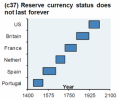And the shopping season continues:
Pay your taxes people, because big companies certainly doesn't want to.
AbbVie To Buy Shire For $54 Billion In Biggest Inversion Deal Ever
Abbvie, the pharmaceutical company based in North Chicago, Illinois, said on Friday that it had agreed to buy U.K. drug maker Shire for $54 billion in a transaction that is designed to lower the American company’s tax rate, the largest inversion deal ever.
U.S. companies, particularly pharmaceutical companies, have been increasingly buying foreign companies in order to lower taxes by reincorporating overseas. There has been a steady drumbeat of such inversion deals that involve ever larger and more well-known U.S. companies and Washington has expressed its dissatisfaction with the tactic.
Treasury Secretary Jacob Lew this week pushed Congress to do something about the wave of inversion deals, but there does not appear to be any imminent agreement between Republicans and Democrats on how to do so.
Lowering its tax rate appears to be the primary reason that AbbVie has entered into a transaction with Shire, whose board supports the deal. Earlier this week, a big pharmaceutical company based outside Pittsburgh, Mylan Laboratories, announced it would buy Abbott Laboratories' international generic drug business in a $5.3 billion deal that will allow Mylan to reincorporate in the Netherlands. Mylan is run by Heather Bresch, the daughter of U.S. Senator Joe Manchin of West Virginia.
The 2014 inversion wave will likely continue unless Washington does something about it. Wall Street is pushing these deals amid a broader mergers and acquisitions boom and the companies considering the move, like Walgreen and Pfizer, are getting increasingly bigger and more prominent. Senator Orrin Hatch this week became the first Republican to endorse a potential short-term approach to stopping inversion deals. The Obama Administration and some key Democrats are backing legislation that would limit inversion deals, including the one announced Friday by AbbVie.
_http://www.forbes.com/sites/nathanvardi/2014/07/18/abbvie-to-buy-shire-for-54-billion-in-biggest-inversion-deal-ever/
The combined companies will have a workforce of 30,000 and a market value of $137bn. Both companies insisted there was little overlap between the two. AbbVie makes the world's bestselling drug, Humira, for rheumatoid arthritis, and Shire is best known for its rare diseases expertise and treatments for attention deficit hyperactivity disorder (ADHD). (...)
The deal would allow Chicago-based AbbVie to diversify its product range and lower its tax bill. AbbVie wants to shift its tax base from the US to Britain as part of the deal, a move that would cut its corporation tax rate from 22% to 13% by 2016. The drugs firm is one of a string of US companies looking to redomicile abroad to save billions on tax, most notably Pfizer, whose failed £69bn attempt to buy Britain's AstraZeneca in May was partly motivated by the tax savings it could make. Jacob Lew, the US treasury secretary, has urged the leaders of the congressional tax-writing committees to act now to stop US firms relocating for tax purposes.
Despite the controversy in the US, the deal is unlikely to trigger the public and political opposition created in the UK by Pfizer's pursuit of AstraZeneca because Shire is largely based in the US. It was founded in the UK but is managed in Boston, headquartered in Dublin and generates most of its sales in the US. It employs fewer than 500 people in the UK – out of a 5,000-strong workforce – and has a small research and development unit in Britain. The deal is not expected to generate big job losses, because of the lack of overlap between the two businesses.
_http://www.theguardian.com/business/2014/jul/18/shire-windfall-takeover-abbvie-pharmaceutical
Pay your taxes people, because big companies certainly doesn't want to.



